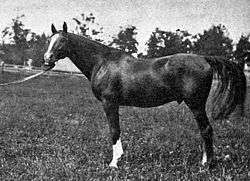Hanover (horse)
| Hanover | |
|---|---|
|
Hanover from the 1906 Types and Breeds of Farm Animals | |
| Sire | Hindoo |
| Grandsire | Virgil |
| Dam | Bourbon Belle |
| Damsire | Bonnie Scotland |
| Sex | Stallion |
| Foaled | 1884 |
| Country | United States |
| Colour | Chestnut |
| Breeder | Runnymede Farm |
| Owner | Dwyer Brothers Stable |
| Trainer | Frank McCabe |
| Record | 50: 32-14-2 |
| Earnings | $118,887 |
| Major wins | |
|
Sapling Stakes (1886) Brookdale Handicap (1887) Champion Stakes (1887) Hopeful Stakes (1886) Withers Mile (1887) Brooklyn Derby (1887) United States Hotel Stakes (1887) Swift Stakes (1887) Spindrift Stakes (1887) Lorillard Stakes (1887) Belmont Stakes (1887) | |
| Awards | |
|
American Horse of the Year (1887) Leading sire in North America (1895, 1896, 1897, 1898) | |
| Honours | |
| United States Racing Hall of Fame (1955) | |
| Last updated on February 4, 2007 | |
Hanover (1884–1899) was a champion American Thoroughbred racehorse that won his first 17 race starts. He was the only American stallion to head the leading sire in North America list for four consecutive years until Bold Ruler did so in 1965.
Background
He was a chestnut colt bred at Colonel E. Clay's Runnymede Farm. Hanover was by Hindoo from Bourbon Belle by Bonnie Scotland. At the farm's yearling sale in May 1885, Hanover was sold to the Dwyer Brothers Stable for $1,250, where he joined Tremont, a very precocious two-year-old also born in 1884.
Racing record
Trained by Frank McCabe, at age two, Hanover won all three races he contested: the Hopeful Stakes, the July Stakes, and the Sapling Stakes. With Tremont retired, the Dwyers turned to Hanover as the mainstay for the Dwyer Stable. Hanover started in 27 races at the age of three, racing at distances ranging from four furlongs (800 m) to two miles (3,200 m.), he won 20 times (including the Belmont Stakes by 15 lengths) and finished out of the money only once.[1] Before finishing his first two seasons of racing, Hanover had won 17 consecutive races.[2]
After several losses at age four, and an obvious lameness to the right forefoot, Hanover was nerved and given the remainder of the year to recover. At age five, he lost three times in his first four starts, but finished the season with 9 wins from his 17 race starts. For most of his racing career, Hanover raced against older and top-class horses while conceding them large weights. Hanover stopped racing as America's greatest earner with a career total of $118,887. From his 50 starts, he won 32 races, was second 14 times, and finished third twice, only unplaced twice.[3]
Stud record
After his racing career ended, Hanover was sold to Colonel Milton Young and sent to his McGrathiana Farm near Lexington, Kentucky, where he enjoyed a very successful breeding career, becoming the leading sire in the United States for four consecutive years (1885–1889). His offspring include Hall of Fame inductee Hamburg, as well as David Garrick, Halma, Compute, The Commoner, Handspring, Half Time, and Yankee. He was also the damsire of Triple Crown winner Sir Barton.[1]
While pawing, Hanover was unable to feel the pain in his 'unnerved' foot, and broke his coffin bone. This led to septicimea, and his condition worsened before he was humanely euthanized in March 1899.[3]
Following the creation of the National Museum of Racing and Hall of Fame, Hanover was part of the first group of horses inducted in 1955.
Tabulated pedigree
| Sire Hindoo B. 1878 |
Virgil Br. 1864 |
Vandal | Glencoe |
|---|---|---|---|
| Tranby mare (12) (1840) | |||
| Hymenia | Yorkshire | ||
| Little Peggy | |||
| Florence 1869 |
Lexington | Boston | |
| Alice Carneal | |||
| Weatherwitch | Weatherbit | ||
| Birdcatcher mare (24) (1853) | |||
| Dam Bourbon Belle 1869 |
Bonnie Scotland 1853 |
Iago | Don John |
| Scandal | |||
| Queen Mary | Gladiator | ||
| Plenipotentiary mare (10) (1840) | |||
| Ella D. 1857 |
Vandal | Glencoe | |
| Tranby mare (12) (1840) | |||
| Falcon | Woodpecker | ||
| Ophelia (Family: 21) |
See also
References
- 1 2 Ahnert, Rainer L. (editor in chief), Thoroughbred Breeding of the World, Pozdun Publishing, Germany, 1970
- ↑ National Museum of Racing and Hall of Fame Retrieved 2010-10-30
- 1 2 Thoroughbred Heritage Retrieved 2010-10-30
- "The Spell of the Turf" by Samuel C. Hildreth and James R. Crowell, J. B. Lippincott & Co., 1926
- Hanover's page in the Hall of Fame
